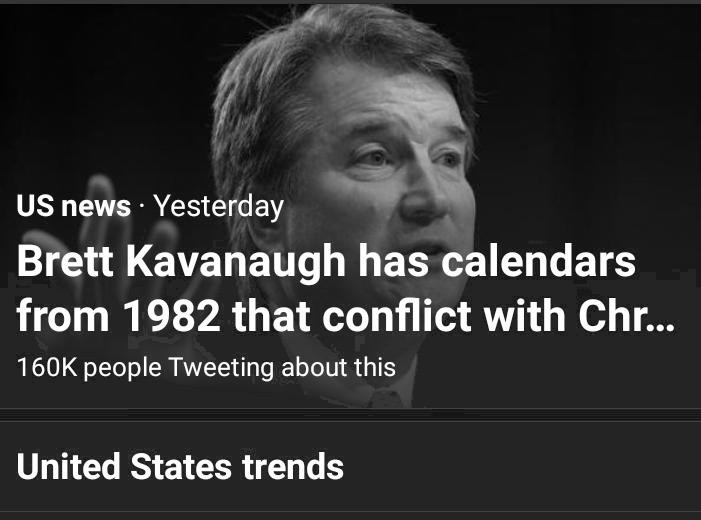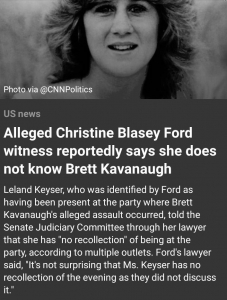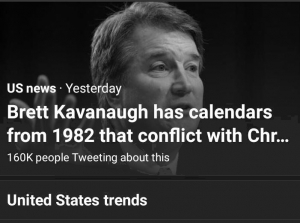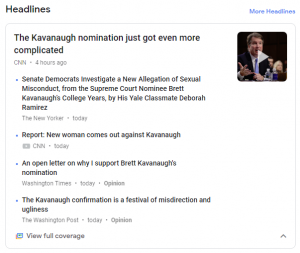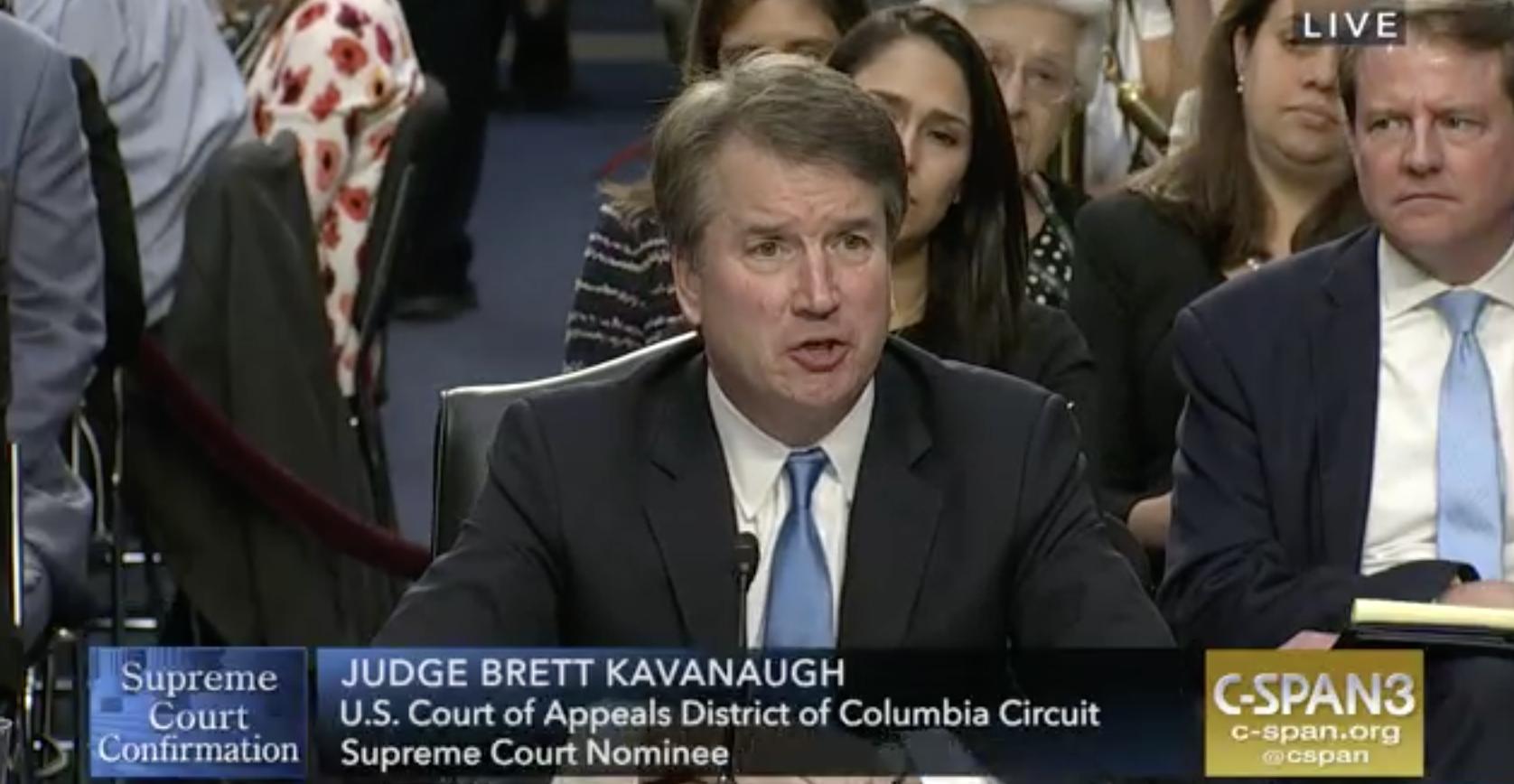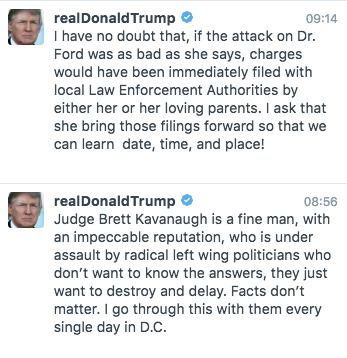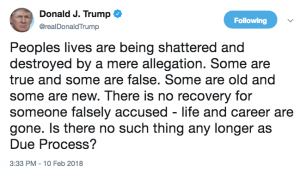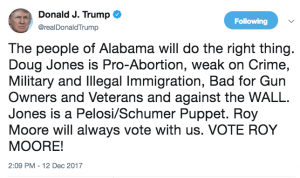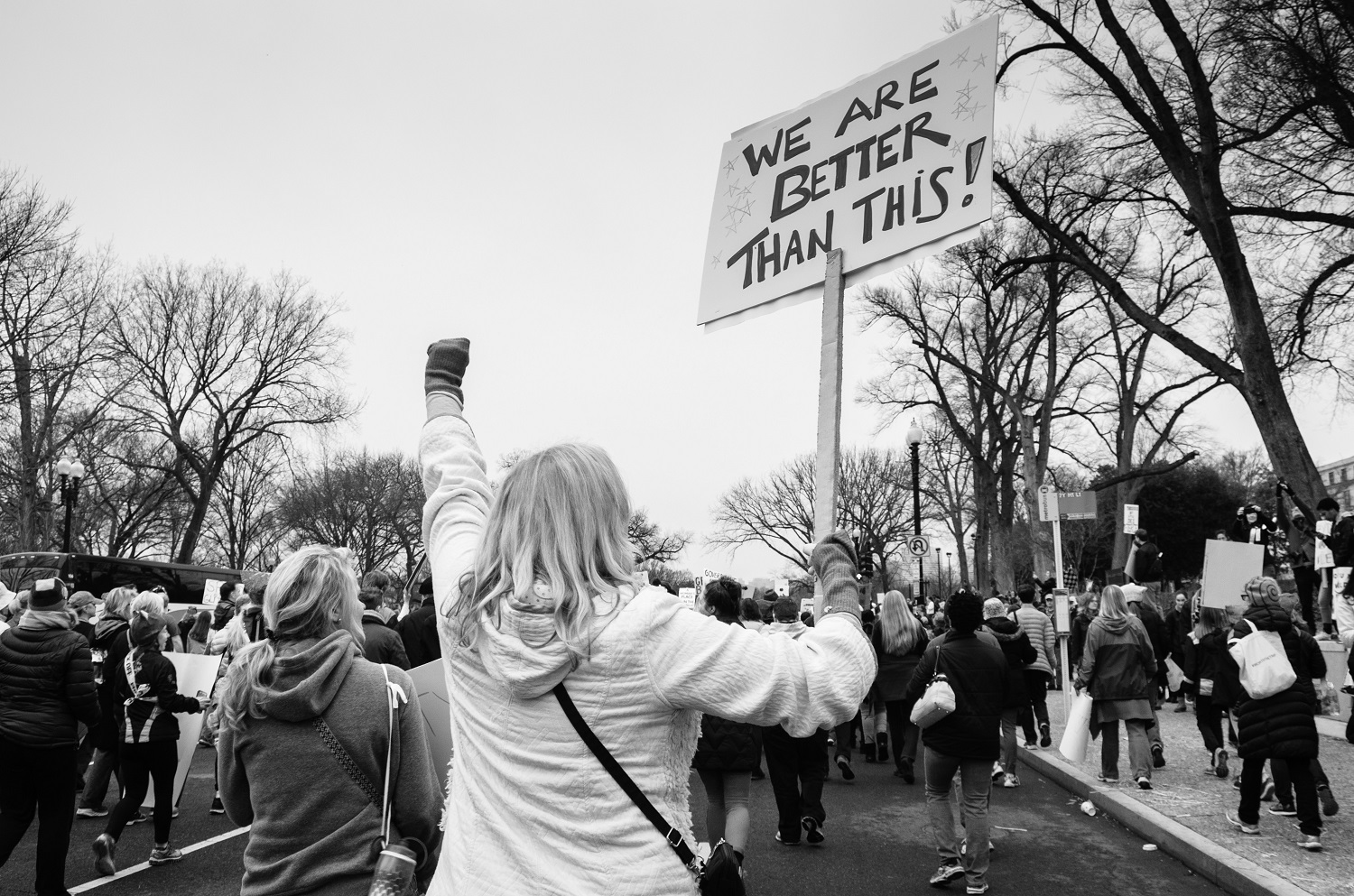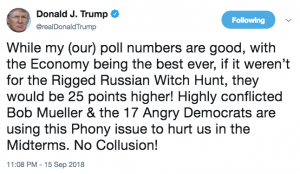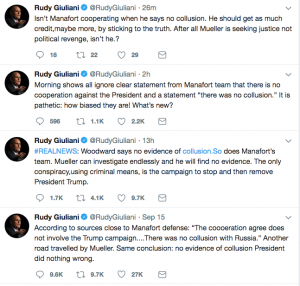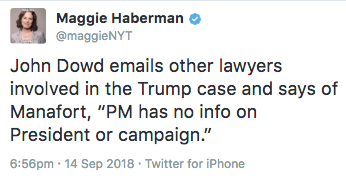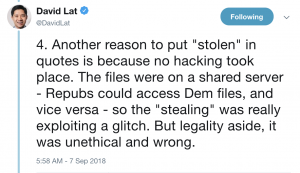This week, Senate Judiciary Committee members are releasing their Questions for the Record for Brett Kavanaugh (questions that he won’t be able to answer given the accelerated confirmation process Chuck Grassley has set). Sheldon Whitehouse’s QFRs have already generated considerable notice. Amid questions about predictable legal (prosecuting a president, environmental rulings, Roe, transgender rights, labor, guns) and GOP rat-fuckery (Starr, staff secretary, and other Bush White House policy issues), Whitehouse asked two questions that should have but did not come up in his hearing: about how debt allegedly tied to Washington Nationals season tickets evaporated when he came under consideration for SCOTUS, and the possibility he’s a heavy gambler (as suggested by one of the letters Don McGahn and Bill Burck tried to keep hidden).
But I’m more interested in some of Whitehouse’s other questions about finances. First, after asking about the baseball tickets, Whitehouse asks why the aspiring Justice has declared himself “exempt” from reporting certain gifts and/or reimbursements.
14. On your Financial Disclosure Report dated July 15, 2018 in Section V. Gifts, you did not check the box for no reportable gifts, you simply wrote “Exempt.”
a. Does this response indicate that you received a gift(s) but considered that gift(s) exempt from the reporting requirements?
b. For each gift (if any) you believe is exempt from reporting, please provide a description of the gift, the approximate value, date received, the donor, and the reason you believe the gift was exempt from reporting requirements.
15. On your Financial Disclosure Report dated July 15, 2018, you did not list any reimbursements. Instead you simply wrote “Exempt.”
a. Does this response indicate that you received reimbursement(s) but considered that reimbursement(s) exempt from the reporting requirements?
b. For each reimbursement you believe is exempt from reporting, please provide a description of the costs incurred, reasons for the costs, the date and amount of any reimbursements that you received for these costs, and the reason you believe the reimbursement was exempt from reporting requirements.
If, as he has claimed, the baseball tickets ended up being gifted by someone, they should be declared here. But then, having asked whether Kavanaugh isn’t declaring gifts he should, Whitehouse then asks about some financial details that also might amount to gifts or other income requiring disclosure: A cost of living adjustment he is known to have received as a judge, a big bump in assets in 2008-2009, the unexplained source of money he used to buy his home, and his membership at Chevy Chase Golf Club.
16. In 2014, federal judges received a lump sum equal to the amount of their delayed cost of living adjustments. For you, this was estimated at $150,000. This amount does not appear to be reported anywhere in your financial disclosures. Please explain this discrepancy.
17. Your Bank of America accounts appear to have greatly increased in value between 2008 and 2009. Your Financial Disclosure Report dated May 15, 2009 reflected a value in the range of $15,001 – $50,000. Your Financial Disclosure Report dated May 14, 2010 reflected a value in the range of $100,001 – $250,000. You did not report any increase in Non-Investment Income, nor did you report any gifts during this period. Please explain the source of the funds that accounts for the difference reflected in these accounts between your 2008 and 2009 Financial Disclosure Reports.
18. In 2006, you purchased your primary residence in Chevy Chase, MD for $1,225,000, however, the value of assets reportedly maintained in your “Bank of America Accounts” in the years before, during, and after this purchase never decreased, indicating that funds used to pay the down payment and secure this home did not come from these accounts.
a. Did you receive financial assistance in order to purchase this home? And if so, was the assistance provided in the form of a gift or a personal loan?
b. If you received financial assistance, please provide details surrounding how this assistance was provided, including the amount(s) of the assistance, date(s) on which the assistance was provided, and the individual(s) who provided this assistance.
c. Was this financial assistance disclosed on your income tax returns, financial disclosure forms, or any other reporting document?
19. You have disclosed in your responses to the Senate Judiciary Questionnaire that you are currently a member of the Chevy Chase Club. It has been reported that the initiation fee to join this club is $92,000 and annual dues total more than $9,000.
a. How much was the initiation fee required for you to join the Chevy Chase Club? What are the annual dues to maintain membership and is this the amount that you pay?
b. Did you receive any financial assistance or beneficial reduction in the rate to pay the initiation or annual fees? If so, please describe the circumstances.
c. If you received financial assistance, please disclose the amount of the assistance, the terms, the dates the assistance was provided, and the individual(s) or entity that provided the assistance.
d. To the extent such assistance or rate reduction could be deemed a “gift,” was it reflected on your income tax returns, financial disclosure forms, or any other reporting document?
The beauty of these questions is that — while I fully expect Kavanaugh to just blow off the slew of questions he’s getting this week (given that they’ve broken the rules everywhere else on this nomination, why the fuck not on QFRs?) — he is now on notice that these financial issues have been noted. If he doesn’t fix any non-disclosures now, he will no longer be able to claim that his failure to disclose required items was just a mistake.
And Whitehouse might believe there are more. He asks, first directly, and then at the end of the series of questions Whitehouse poses about the credit card debt, whether Kavanaugh’s in debt to people he hasn’t told us about.
Are there any debts, creditors, or related items that you did not disclose on your FBI disclosures?
Did you have any creditors, private or otherwise, not listed in your Financial Disclosure Reports?
My favorite bit about Whitehouse’s QFRs, however, is that at the end of all these financial questions, the former US Attorney and Attorney General then asks whether lying under oath is an impeachable offense.
24. Is lying under oath an impeachable offense for an Article III judge?
You see, we can argue Kavanaugh lied under oath in his confirmation until we’re blue in the face. Kavanaugh, each time, will offer a well practiced lawyer’s parse about how his transparently dishonest comments don’t amount to perjury, and he’ll get away with that.
But finances are a different issue. Whitehouse has put Kavanaugh on notice that not disclosing certain things — like who paid for his house or paid off his season ticket debt — will amount to lying.
So Kavanaugh may blow off these questions. But that may come back to haunt him.
Update: Here are Kavanaugh’s answers on finances — basically, he says he has followed disclosure guidelines on all of this, which may necessarily mean that the big ticket items, including the down payment for his home, came from Daddy. The one thing not addressed here are big gifts from family.
I have truthfully provided financial information in conjunction with this nomination process and my service in the judicial and executive branches. Since I graduated from law school in 1990, I have worked in public service for 25 of those 28 years. For most of her years of paid employment, my wife likewise has been a federal, state, or local government worker.
During that time, I have filed regular financial disclosure reports as required by law. The Federal Government’s required financial disclosure reports list broad ranges for one’s assets and debt as of one day or period in time.
At this time, my wife and I have no debts other than our home mortgage. We have the following assets:
(1) A house minus the mortgage;
(2) Two Federal Government Thrift Savings Plan retirement accounts (largely accessible to us beginning in 2024), as well as a Texas employees’ retirement account;
(3) A bank account;
(4) A car that we own and a car that we lease; and
(5) Ordinary personal furniture, clothing, and belongings.
Since our marriage in 2004, we have not owned stocks, bonds, mutual funds, or other similar financial investments outside of our retirement accounts.
Our annual income includes my income as a federal judge, my income from teaching law each year, and now also my wife’s income from being Town Manager of Section 5 of Chevy Chase, Maryland. Our annual income and financial worth substantially increased in the last few years as a result of a significant annual salary increase for federal judges; a substantial back pay award in the wake of class litigation over pay for the Federal Judiciary; and my wife’s return to the paid workforce following the many years that she took off from paid work in order to stay with and care for our daughters. The back pay award was excluded from disclosure on my previous financial disclosure report based on the Filing Instructions for Judicial Officers and Employees, which excludes income from the Federal Government. We have not received financial gifts other than from our family which are excluded from disclosure in judicial financial disclosure reports. Nor have we received other kinds of gifts from anyone outside of our family, apart from ordinary non-reportable gifts related to, for example, birthdays, Christmas, or personal hospitality. On the 2018 financial disclosure report, I correctly listed “exempt” for gifts and reimbursements because those are the explicit instructions in the 2018 Filing Instructions for Judicial Officers and Employees.
At this time, we have no debts other than our home mortgage. Over the years, we carried some personal debt. That debt was not close to the top of the ranges listed on the financial disclosure reports. Over the years, we have sunk a decent amount of money into our home for sometimes unanticipated repairs and improvements. As many homeowners probably appreciate, the list sometimes seems to never end, and for us it has included over the years: replacing the heating and air conditioning system and air conditioning units, replacing the water heater, painting and repairing the full exterior of the house, painting the interior of the house, replacing the porch flooring on the front and side porches with composite wood, gutter repairs, roof repairs, new refrigerator, new oven, ceiling leaks, ongoing flooding in the basement, waterproofing the basement, mold removal in the basement, drainage work because of excess water outside the house that was running into the neighbor’s property, fence repair, and so on. Maintaining a house, especially an old house like ours, can be expensive. I have not had gambling debts or participated in “fantasy” leagues.
The Thrift Savings Plan loan that appears on certain disclosure reports was a Federal Government loan to help with the down payment on our house in 2006. That government loan program is available for federal government workers to help with the purchase of their first house. In our case, that loan was paid back primarily by regular deductions from my paycheck, in the same way that taxes and insurance premiums are deducted from my paycheck. That loan has been paid off in full. I am a huge sports fan. When the Nationals came to D.C. in 2005, I purchased four season tickets in my name every season from 2005 through 2017. I also purchased playoff packages for the four years that the Nationals made the playoffs (2012, 2014, 2016 and 2017.) I have attended all 11 Nationals’ home playoff games in their history. (We are 3-8 in those games.) I have attended a couple of hundred regular season games. As is typical with baseball season tickets, I had a group of old friends who would split games with me. We would usually divide the tickets in a “ticket draft” at my house. Everyone in the group paid me for their tickets based on the cost of the tickets, to the dollar. No one overpaid or underpaid me for tickets. No loans were given in either direction.
My wife and I spend money on our daughters and sports, including as members of the Chevy Chase Club, which we joined in recent years. We paid the full price of the club’s entry fee, and we pay regular dues in the same amount that other members pay. We did not and do not receive any discounts. The club is a minute’s drive from our house, and there is an outdoor ice hockey rink and a very good youth ice hockey program. We joined primarily because of the ice hockey program that my younger daughter participates in, as well as because of the gym.
Finally, it bears repeating that financial disclosure reports are not meant to provide one’s overall net worth or overall financial situation. They are meant to identify conflicts of interest. Therefore, they are not good tools for assessing one’s net worth or financial situation. Here, by providing all of this additional information, I hope that I have helped the Committee.
He refused to answer Whitehouse’s question about whether lying under oath is cause for impeachment.

